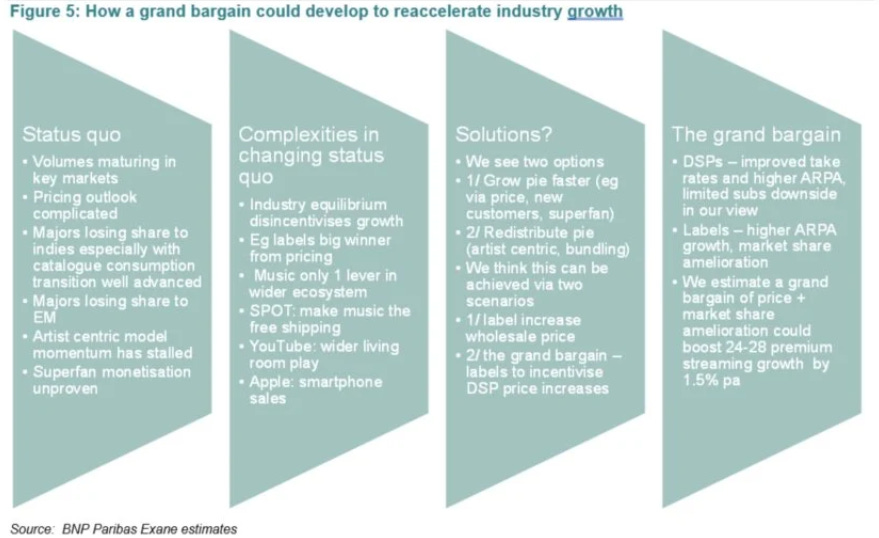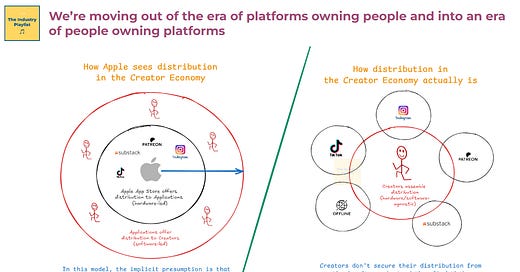Hi folks
Happy Wednesday! Welcome to The Industry Playlist 🎵
This week’s dive into the music industry has us questioning everything from who controls the creator economy to how big labels and DSPs are navigating the streaming slowdown. We’ve got Apple increasing squeezing creator platforms for a 30% cut; major labels and DSPs plotting a ‘grand bargain’ to keep their shareholders happy; and Airtel shutting down Wynk Music in a bid to dominate India’s digital entertainment market in partnership with Apple.
Finally, we talked a lot about indie labels and A&R recently, we don’t talk enough about the folks behind the indie labels, who are often prolific music producers themselves. The Funk District is a producer from Mexico bringing a fresh sound to traditional funk, soul, and African music. Check out New Rising 🎵
Now, let’s get to it.
🪁 SONIC SHIFTS
The 30% Creator Tax Squeeze
Whoever controls distribution can charge a premium for access—that’s the Apple and Google app store model, taking 30% of all in-app purchases. But in a world where independent creators are building their own distribution on diverse digital platforms, should they still be expected to pay Apple or Google? That’s the real question for the creator economy.
Apple is strong-arming Patreon, demanding they switch to Apple’s billing system or risk getting booted from the App Store. Sure, Apple’s in-app purchase system is convenient—stable, safe, and frictionless—but forcing creators to cough up 30% for building their own audience is nothing short of exploitative.
We’re moving out of the era of platforms owning people and into an era of people owning platforms—an era in which creators will rightfully demand more ownership, and more say over their relationships with their communities - it’s the age of the sovereign creator.
Creators, in fact, are second-order platforms in their own right. They’re building distribution outside of Apple and Google’s walled gardens, and they’re not the traditional customers these tech giants are used to. Yet, with the current bullying tactics, creators on Patreon are left with two bad options: pass the extra cost onto their subscribers or absorb it themselves. Being a creator is hard enough without an additional operating tax. Instagram & Spotify already bypass the Apple’s in-app payment system but perhaps they are too big to be threaten with expulsion.
And Patreon isn’t alone. Substack and countless other platforms are staring down the same fate. This isn’t just a one-off—it’s a structural flaw rooted in how the commercial internet has been shaped over the last two decades. These tech monopolies keep selling the illusion of ‘democratizing creation’ to continue operating the way they do, when in reality, they’re out to squeeze every dollar they can from creators under the guise of “distribution.”
DSP/Label Relations - The Grand Bargain
We think the recent upheaval and evidence of volume maturity could act as a positive catalyst for a reset in DSP/label relations driving a new ‘grand bargain’ of more pricing for a more even distribution of economics. This could drive significant upside to current forecasts for DSPs and Labels. - William Packer, Financial Analyst
Translation: Paid subscriber streaming is slowing down, but major labels and DSPs can’t stop making more money because, well, shareholders need to stay happy. So, why not come up with a mutually beneficially deal to hike subscription prices and share the new spoils? Sorry, artists, you’re not in the conversation.
The buzz in the financial world is that major labels may offer DSPs a bigger slice of the streaming pie—if DSPs bump up subscription prices. It’s all about keeping those stock market expectations in check. After all, both major labels and DSPs are publicly traded.

A slide from William Packer’s latest BNP Paribas Exane research note, explaining how a ‘grand bargain’ could work between UMG and DSPs like SpotifyI am firmly of the view that any license renegotiation between DSPs and Major Labels must include the creators on the platform. Where are the artist industry/trade bodies when you need them?
Apple absorbs Wynk Music subscribers in new Airtel partnership
Airtel is shutting down Wynk Music, offering its subscribers a bundled service through a new partnership with Apple’s content business. This deal effectively sunsets a struggling streaming platform while giving Apple a new distribution channel in India to expand its OTT video and music services for Indian users.
It’s a big win for Apple in India. While Airtel has a massive distribution network (281 million subscribers), Apple doesn't. On the other hand, Apple brings a vast library of high-quality content and in-house productions to the table. This partnership takes us back to basics—telcos acting as platforms, aggregating and bundling content from specialized platforms. In essence, they return to being the pipes that deliver voice, data, and now content.
This move, along with similar partnerships and industry consolidation, signals a larger play to dominate the digital entertainment market in India.
📚 CURATED INSIGHTS
🚨 The enshittification of music [Podcast] - Cory Doctorow is the guy who coined the term ‘enshittification’, which is when monopolistic digital platforms offer increasingly worse services to continue making money. Fantastic podcast on the creator labor market forces and modernization of copyright laws.
The Salary Transparency Project - Some good folks are bringing transparency to the topic of music industry salaries. The survey is based on the US/UK market primarily but a good resource nonetheless on understanding the growth opportunities in the industry. Check out their data dashboard.
Zuckerberg & Daniel Ek on embracing AI - Two of the biggest tech lords are complaining about how European regulations are slowing down the AI industry. “This ensures power isn’t concentrated among a few large players and, as with the internet before it, creates a level playing field” - wolf crying fowl imho.
Spotify Triumphs Against Eminem Publisher - Spotify emerged victorious in the case despite the court having found that the streaming giant did not actually have a license to stream Eminem’s tracks. This is messy territory and just shows how complex rights administration is in today’s world.
Why is OpenAI paying publishers if it already took their work? - The number of underhand deals in this space is pretty problematic.
🔥 KEEP TRACK OF
Oasis reunion ticketing furor - The reunion aside, it is touted to be the most popular tour in British history. But there is a problem - there’s a huge furor about dynamic pricing of the tour ticket sales. So much so, the UK government has gotten involved. Even hotels are canceling existing bookings and reposting the rooms at 3x the original price. I think this event will single-handedly set the precedent for ticketing reform for the music industry.
Sony has launched a new blockchain platform - A web3 infrastructure platform called Soneium where it is exploring ways to protect creators’ rights. Only natural to expect that this will potentially integrate with its music catalog. I’ve written about web3’s music comeback in Edition 05.
Social music-sharing with Instagram + Spotify - Zuck and Ek seem to be talking a lot these days. Apart from sharing their views on AI, some feature development/integration is also underway.
❄️ INTERESTING STUFF
Geo-specific streaming service - a streaming platform dedicated to featuring only local music? Shockoe Records, a local label, recently launched "The Sound of Richmond" as a subscription-based streaming service for Richmond's businesses, restaurants and bars to play over their sound systems.
Nobody reads ads - an archive of old print and outdoor advertisements. Gold.
That’s all for today. We’ll be back in your inbox next week.
Thanks for reading,
Rohit




